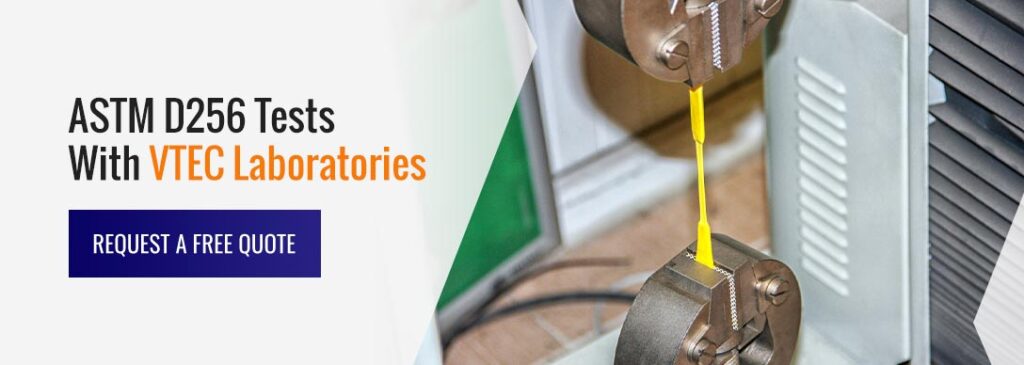ASTM D256
As a leading commercial and testing service, VTEC Laboratories offers ASTM D256 testing to ensure your company meets safety regulations. We provide reputable testing in a controlled facility. Trust our tests to deliver the accurate and timely results you need.
What Is ASTM D256 Izod Impact Testing?
The Izod Pendulum Impact Resistance of Plastics test measures a plastic specimen's resistance and strength by breaking it with a pendulum-type hammer. This test is similar to the Charpy impact test.
Machines with these pivoting hammers must meet certain requirements, such as a fixed height for the hammer. The height creates a fixed velocity at the moment of impact. Hammers can vary in weight to produce different initial energies to test specimens of various impact resistance. Other lengths, pendulum constructions and rigidities are also allowed.
Specimens must be made with a particular design with a milled notch of a fixed length and depth. The notch helps concentrate the stress and direct the fracture from the swinging arm. It minimizes plastic deformation and ensures the break occurs behind the notch.
At VTEC Laboratories, we use Method A testing, in which the notch produces a certain stress concentration to increase the probability of a brittle fracture rather than a ductile one.
ASTM D256 Specifications
Five samples are required for an average to be taken in the Izod impact test. The plastic sample must be cut to these specifications:
- 2.5 inches in length
- .5 inches in width
- .125 inches in thickness
The notch must be cut out of the middle of the sample. Accuracy is required for the angle, radius, placement and depth of the notch. A broaching machine is recommended to help achieve the required accuracy.
The energy absorbed by the sample will determine the impact energy and notch sensitivity within the specimen. The results of the tests are reported in terms of energy absorbed per unit of thickness. Results can be expressed in joules per centimeter (J/cm) or foot-pounds per inch (ft.lb./in.). They can also be reported as the energy absorbed per unit of the cross-sectional area under the notch — joules per meter squared (J/m2) or foot-pounds per inches squared (ft.lb./in2).
Testing parameters that may affect test results include:
- Fabrication method
- Notch quality
- Time between notching and test
- Test specimen thickness
- Width under notch
- Environmental conditioning
Why Choose VTEC Laboratories for Your Testing Needs?
VTEC Laboratories has performed ISO 17065, 17025 and 17020-accredited physical materials tests for decades. We can do plastics testing for the aerospace industry, military applications, manufacturing, chemical plants and more. Our testing meets all the requirements of the American Society for Testing Materials (ASTM) and the International Organization for Standardization (ISO).
When testing the impact resistance of your plastic materials, there is little room for error. When you submit your plastics to VTEC for testing, our highly trained, elite engineers will administer your test. These engineers are fully versed in ASTM methods and can customize the test to your needs if required.
ASTM D256 Tests With VTEC Laboratories
Contact us online to learn more about our ASTM D256 testing services. Request a quote or see what custom tests we can conduct for you.
Learn More About VTEC Services
At VTEC Laboratories, our role as a multi-functional company stems from our more than three decades of experience. Due to our extensive expertise in multiple industries, we provide comprehensive services that meet each field’s unique standards, needs and objectives.
Learn more about our services by contacting us online or calling us at (718) 542-8248.

